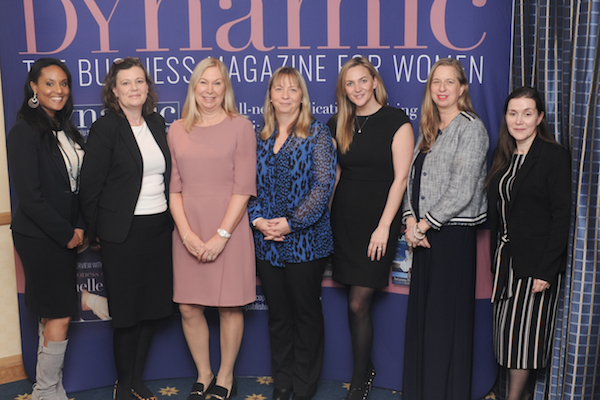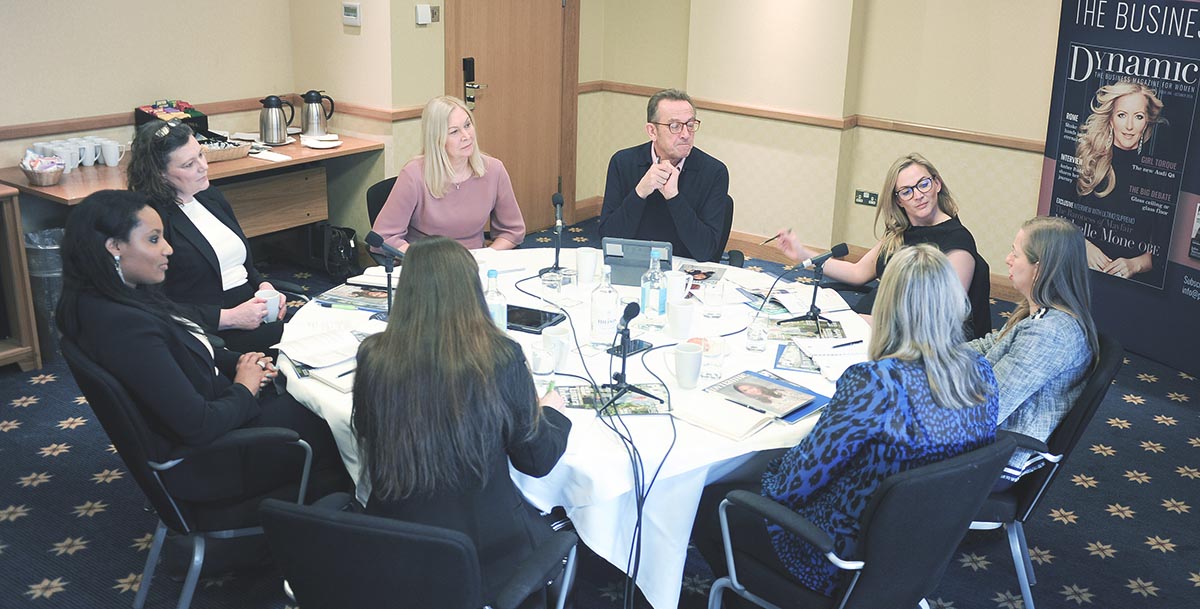
LESLEY ALCOCK
Platinum Publishing Group
Lesley Alcock, Commercial Director of The Platinum Group, publishers of the UK’s widest- read business magazine and producers of the South’s largest business awards including, The Sussex Business Awards, The Surrey Business Awards and more. Lesley has had a varied career working at The London Evening Standard, The Observer Newspaper and as part of the creative partnerships team at Capital Radio.
REBECCA BURFORD
Charles Russell Speechlys
Recently promoted to Partner, Rebecca Burford is one of the youngest partners in Charles Russell Speechlys. Ranked as
‘Next Generation Partner’ in the Legal 500 2019, she is able
to quickly grasp, understand and effectively communicate complex issues. Impressing clients with her comprehensive legal knowledge and experience, Rebecca was recently placed in The Lawyer’s Hot 100 list of legal market trailblazers.
SAMANTHA KAYE
Wellesley Wealth Advisory
Samantha Kaye joined Wellesley Wealth Advisory as a Financial Advisor after having spent 20 years working in a pensions, legal and technical environment. During this time she provided detailed assistance to a variety of St James’s Place Practices, helping to formulate plans for their clients. Samantha now wishes to help her own clients by focusing on pensions, investments and inheritance tax planning.
EMMA LANE
Allied Irish Bank
Emma Lane is the South East Area Director for Allied Irish Bank. Her role is to lead a team of banking and finance professionals. Emma has been in banking for 20 years, having worked for Barclays and Lloyds. She was one of the first girls to attend the previously all boys school Marlborough College, where her love for all things challenging stems from.
ANA CHRISTIE
Sussex Chamber of Commerce
Ana Christie is the CEO of the Sussex Chamber of Commerce, which aims to help businesses grow, develop, discover and influence. Ana’s career began in aviation, before later entering senior management in the hotel and tourism industries.
Ana joined the Chamber over five years ago and has since re-established it as the largest membership organisation in the county.
VICKY STEVENS
NatWest/ RBS Group
Vicky has worked with the NatWest/ RBS group for 12 years and has specialised in business banking as Business Growth Enabler for the past eight years. Passionate about supporting female entrepreneurs, she was delighted to take the lead in a project to work alongside Coast to Capital, becoming the UK’s first Expert in Residence off the back of the Rose Review.
MELANIE RICHARDSON
Swindells Chartered Accountants
Melanie Richardson is Managing Partner at Swindells Accountants. Melanie qualified as a Chartered Accountant in a top 20 firm over 20 years ago and has worked both in practice and in business. She has extensive experience in running businesses and has been managing partner at Swindells LLP for the last seven years.
DOES THE GENDER PAY GAP STILL EXIST?
Emma. I’m sure still there is, especially as women often work for a long time in one organisation. If you’ve been able to move about in your career, then that tends to negate a lot of the pay gap challenge. But many women will think: “I’ve got a job, it works me, so I’m staying where I am”.
Rebecca. You simply have to ask for more money. When I first qualified, I told the agent who got me my first job to ask for another £3,000. He was reluctant to ask but the firm agreed. I was doing his job for him. I later discovered that other people who joined at the same time were on £3,000 less than me.
This is unusual. I know so many women who have been working for 10 or 15 years, and have never asked for a rise. They feel they don’t deserve it and they shouldn’t ask. The guys ask for more without batting an eyelid. Maybe I think more like a man, but it has definitely got me further.
Lesley. It is a fact that women are also less likely to challenge their bosses and demand a pay rise.
Melanie. You don’t have to behave like a man. You are a woman but your thinking is more assertive than many women. There isn’t necessarily a sexist salary bias, more of an issue about whether women ask for more.
In one job, I was on a lot less than a colleague just because he’d asked for more. When I found out, I demanded the same as him and I got it. The company just assumed that my negotiation skills weren’t as good as his! I just didn’t ask soon enough.
Emma. I have been fortunate in the last 15 or so years in that I’ve worked for big high street names and their maternity leave policies are very robust. The only time I was put in a position of feeling very uncomfortable on my return to work was down to one individual, not the firm.
Ana. I was in a senior position, managing a business, and I was made to feel so guilty when I told my boss that I was pregnant. There was no support at all. I literally stopped work a week before my son was born and there was so much pressure for me to return to work. I felt so guilty.
Rebecca. I’ve got a lot of friends who have returned to work successfully, but they have spouses or partners who are able to work flexibly. One of my friend’s husband works for HMRC, and he does all the childcare and steps in if their daughter is ill. If you are the one who is the default carer, then returning to work can be very challenging.
HOW DIFFICULT IS RETURNING TO WORK AFTER CHILDREN?
Samantha. I took six months off with both my child- ren, but fortunately worked for a big corporate back then. They were super flexible but you still feel the guilt as a returning-to-work mother, especially when your child is poorly or they have a doctor’s appointment. The guilt is often the biggest problem.

HOW CAN WE INTRODUCE GENUINE FLEXIBLE WORKING?
Melanie. One of my partners has a two-year-old and probably once a week the nursery rings and says she’s got a temperature or she’s not well. No matter how flexible your employer is, it does become a problem. As a partner he’s got quite a bit of flexibility, but a junior member of staff would really struggle.
Lesley. Flexible working is growing because it is a fantastic solution to childcare issues. It’s now a lot easier to work from home, and you can also keep in touch through Skype. Flexible working isn’t just for mothers it’s there for men and women. The other side of the coin is ageing parents. People are often looking after their parents as well as their children.
Vicky. It’s not just for parents. It’s there if you have an unwell family member. This happened tomeanditworkedasifIhad stayed in the office, my head wouldn’t have been in the right place, and I was still able to get on with things.
Melanie. It has got to come down to the employer realising that you’ll get more out of people by allowing that flexibility and trusting them. Everyone wants to do the best that they can, but sometimes they have to look after their family.
Emma. Some jobs cannot be as agile as others, so for certain jobs you can’t just say I have to leave now. But it can be flexible if planned a few days in advance.
It’s taken me over two years to encourage my team to embrace agile working. They’ve come from a traditional branch banking background which says they must be in the branch at 8.45am mustn’t leave until 5pm.
Men have struggled more with embracing agile working. One of my team needed to care for his adult daughter who had broken her leg and he needed flexibility, which I was able to give him. Prior to that he had dismissed the idea of working from home. It took a long time for him to accept it was possible.
Lesley. Men fear missing out on what’s going on because they’re so competitive. They also think that if they’re not in the office, they will be judged negatively.
It’s the subconscious bias again. I actually do think a lot of men believe it’s not their job to look after the baby, it’s their wife’s job. In their mind, their job is more important and they are the major breadwinner.
Melanie. I still feel guilty if I’m working at home and yet I get so much more done. I feel like I’ve got to answer every email really, really quickly so everyone knows I’m still sitting in front of the screen.
Rebecca. At my previous firm I worked from home on a Monday, Wednesday and Friday. When I moved jobs, I said I wanted to work flexibly. I was told it would be fine if I needed to go to a dental appointment, but I insisted flexible working was in my contract. I was the first person in the firm to have formal flexible, agile working - and we now have a policy that’s rolled out for all staff.
One frustration is that people will not contact me on a Monday as they think it’s my day off. I have to correct them and point out that I am working, but just not in the office.
Melanie. Women tend to work in a different way. Research shows that women are much more collaborative. When they are looking for a business relationship, they’re actually looking for someone to do things with them in partnership, to link arms and move forward together.
The stereotype is that a man knows what he wants, and he goes and gets it. Women want to be much more collaborative in their approach. A woman who is thinking about setting up a business is less likely to do it on her own.
I’ve actually got quite a few women clients in traditionally male dominated industries. The servicing of the relationship with a man or woman in manufacturing is different. The guy may want more of a transactional service and to know you’re there if they need to pick the phone up and request a service. A woman will ring you up and say, ‘I’m a bit worried about this’ and ask if we can sit down and have a chat about how we’re going to move this forward. There is generally a real difference in the relationship depending on the gender of the person you are dealing with.
Emma. I can think of many female clients who are exactly as you describe: “Let’s meet for coffee so I can talk this through with you.” Women will often want to talk everything through including things that might not happen. The point is she wants to know that we are listening to her.
SHOULD THERE BE DIFFERENT BUSINESS SOLUTIONS FOR MEN AND WOMEN?
Ana. We focus on providing the services that businesses need, regardless whether the business is run by a male or female. It would be very challenging to start focusing on targeting the services. We do hold events which target specific groups, which is very different. In terms of services, whether it’s marketing support, finance, lead generation or finance, the same issues come up for male-run and female-run businesses.
Rebecca. All the studies show that girls tend to thrive better at a younger age in a single-sex school. Boys hold them back because they want to be breaking things and putting them back together rather than sitting attentively and learning.
But my daughter’s experience was that by moving from a girls school to a mixed school from 11 onwards, it diluted the bitchiness. Educationally, she probably did better being a single-sex school, but the bitchiness at the all-girls school was awful.
DO GIRLS GET A BETTER PREPARATION FOR LIFE AT AN ALL-GIRLS SCHOOL?
Emma. My daughter was in a co-ed school until last year when she was 13, and now she is at an all-girls grammar school. I thinks she misses the balance of having boys around. She plays rugby and is doing and is in the Combined Cadet Force (CCF). She wants to be a doctor in the army. There is a danger that girls can be distracted by having boys around, affecting their studies, but she has never been phased by boys. Having a brother probably helps in that respect.
ARE FEMALE NETWORKING GROUPS SEXIST?
Samantha. I attend a very successful all-female professional networking group. It’s lovely. I’m a natural talker and networker, but not everyone is like me. It’s a really big deal for many women to come along and talk about themselves. You can always spot the new person in the room who is sat very quietly at the back, not really sure how to engage. Once they realise it’s a safe environment, they start to talk about themselves and what they’re trying to achieve. After that, they can’t stop talking!
Vicky. The danger is that when we talk about making positive changes we are just talking to the same sex,
and everyone needs to be involved to improve things. But I understand the value of all-female groups from a confidence point of view. I am in favour of having options, and if a man wants to come along he shouldn’t be shut out.
Samantha. The women’s professional network works
as many women are very uncomfortable about promoting themselves.
Women don’t like to talk about themselves. I’ve seen women from that networking group go onto mixed networking groups because they’ve gained the confidence.
It’s given them a bit of comfort that actually they have got a good business and that they now need to get the word out there.
Melanie. Don't forget, there are some very traditional male- dominated networking methods such as golf. A lot of business is done on the golf course. Even now, there are very few women who play a lot of golf. I can’t think of anything worse than spending a morning hitting a ball and losing it.
The women’s networking groups started to spring up as there was no place for them to go. However, it does run the risk of going too far the other way.
Lesley. I play golf for pleasure, but there is the opportunity to network, and there are some very good corporate golf days. Sailing is another sport which mixes both pleasure and business, which again is dominated by men. There are more and more women like myself taking part and it is changing, but probably too slowly.






